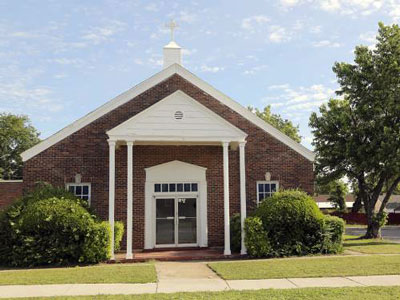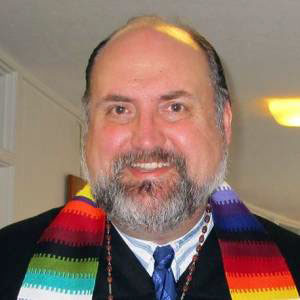Meetings offer opportunities for storytelling, healing and dialogue
May 29, 2017
One Oklahoma church has adopted a unique format in its effort to confront personal and societal racism. Trinity Presbyterian Church in Oklahoma City began a 10-week “Racism and Racists Anonymous” discussion group in February.
The Rev. Richard Mize, the church’s pastor and real estate editor at The Oklahoman, modeled his meetings after the Rev. Ron Buford’s “Racists Anonymous” meetings at Congregational Community Church (United Church of Christ) in Sunnyvale, California. Each meeting highlights a personal account of racism or an encounter with racism, which leads to discussion on individual responses to racism.
“I stumbled across what [Ron] Buford was doing, read it and said, ‘That’s us; we’ve got to do this,’” Mize said. “At the time, I didn’t know he was a black man serving a mostly white congregation. I just read a story about a pastor in California doing this, and when I learned he was African-American, thought that’s kind of an upside-down mirror image of my situation here.”
Mize, who is white, describes himself as a “proud Southerner” who, although he came to Christianity as a young person in opposition to the culture of racism around him, didn’t see anything wrong with the symbolism of the Confederate flag until sometime in his 40s.
“It’s hard to say that I was a mild racist,” he said of his admission during the meetings. “They all laughed when I said that. … But it took a few encounters with black friends for me to walk away from it and to repent of it. Thank God that happened before ‘Mother Emanuel’ [Emanuel AME Church in Charleston, South Carolina, where Dylann Roof shot nine black parishioners dead]. I was so glad it didn’t take that for me to furl that flag.”
Trinity’s membership is 75–80 percent African-American and the “Racism and Racists Anonymous” group, which has averaged 20 people at each of the past six meetings, has matched that demographic mix. The church is the result of a merger between two congregations in the mid-1960s—the predominantly black Bethel Presbyterian Church and the predominantly white Creston Hills Presbyterian.
For his part, Buford said earlier attempts at dialogue on racism resulted in “white people feeling guilty and black people feeling angrier.” A trip to England—what he calls a “race vacation” because of the lack of racism he felt directed at him as a black American—showed him that racism exists in all cultures because racist remarks were being leveled against those from Eastern Europe, the Caribbean and Africa instead of him.
At his current church, which has Alcoholics Anonymous meetings every day at noon just outside his office, Buford began to tie together AA’s methodology and a possible framework for more constructive work on racism.
“I wondered if we’d been going at racism in the wrong way,” he said of the realization. “I wondered if we should treat racism as more of an addiction, and more of an illness, in the same way we treat alcoholism.”
So just like AA, Buford asked his group to look at themselves, not other people, but their own racism. “Ron Buford is working on Ron Buford’s racism,” he said. “We assume everybody is a racist. The goal is to be more mindful of our racism, exercise and practice it less, pass less along, so that in two or three generations we may have a racist-free society.”
Buford’s group has been meeting for more than a year, and groups in North Carolina, Alabama and California have developed along the same model.
“Of all the things we can call people in America today, to be called racist is the one of the worst,” he said of the reluctance to confront personal and institutional racism. “It’s the reason our churches are racist. Not unlike alcoholism, we are in denial. It’s not going to end in our kind, sympathetic organizations until we admit we are racist. And we’re not going to change until we remember it, and repent of it daily.”
Gregg Brekke, reporter, Presbyterian Mission Agency
Today’s Focus: Racism and Racists Anonymous’ series
Let us join in prayer for:
Indian Nations Presbytery Staff
Sue MacHugh, administrative assistant
Matt Meinke, stated clerk
Lee Ann Finn, accountant
PC(USA) Agencies’ Staff
David Eicher, PPC
Vanessa Elkin, FDN
Let us pray:
Lord, teach us to break bread with our newest neighbors. Teach us to share with and receive from our neighbors. Teach us to be open to differences, to tolerate new behaviors, and to meet you in the people you give to us. Amen.
Daily Readings
Morning Psalms 97; 145
First Reading Ezekiel 4:1-17
Second Reading Hebrews 6:1-12
Gospel Reading Luke 9:51-62
Evening Psalms 124; 115
![]() You may freely reuse and distribute this article in its entirety for non-commercial purposes in any medium. Please include author attribution, photography credits, and a link to the original article. This work is licensed under a Creative Commons Attribution-NonCommercial-NoDeratives 4.0 International License.
You may freely reuse and distribute this article in its entirety for non-commercial purposes in any medium. Please include author attribution, photography credits, and a link to the original article. This work is licensed under a Creative Commons Attribution-NonCommercial-NoDeratives 4.0 International License.
Categories: Mission Yearbook
Tags: dialogue, healing, mission yearbook, oklahoma city PC(USA) church, Racism and Racists Anonymous

